Casein protein guide: benefits and dosage

Casein protein is a calcium-rich, slowly digestible protein source that is anti-catabolic in nature. It remains the main product of sports nutrition (food additive) for top bodybuilders, athletes, and fitness enthusiasts.
Article of contents:
- What is casein protein?
- Advantages of casein protein. Overview of the benefits of casein
- How do casein proteins make?
- What is casein hydrolyzate and micellar casein?
- How to take casein protein?
- What is the best time to take casein protein?
- Whey protein against casein protein
- Casein Frequently Asked Questions (FAQ)
All of your actions aimed at achieving your bodybuilding and fitness goals originate from the right sports nutrition for bodybuilding. Providing physical pressure and pressure on your body, which significantly exceeds the comfort zone, there are conditions in your body that can significantly increase the demand for protein.

Increased demand for protein can become burdensome when you meet your protein needs using purely solid food sources such as eggs, poultry, meat, etc. – it is in such cases that the sources of protein in the form of food additives become irreplaceable. Most professional and even beginner athletes are constantly convinced of the benefits of whey protein because it is rapidly absorbed and has a high bioavailability (bioavailable form). However, casein protein can become an even more acceptable option in most cases.
This material is an exhaustive guide for the host of casein protein athletes, with a detailed interpretation of what casein protein is, how it is produced, what benefits it has, how it differs from whey protein, who should take it, and what products we recommend.
What is casein protein?
Casein protein (protein) is nothing more than a key component of animal milk proteins (accounting for about 80% of the total protein content), they are often praised for their extremely slow digestion and absorption rate. Specific fractions/kinds of casein protein (denoted by alpha s1 / s2, beta, and kappa) differ in the proportion of the components from which they are synthesized. The main source of casein protein (protein) in human nutrition is dairy products of large livestock. Further, throughout the remainder of the manual, the term “casein” will be used in the singular, with all 4 fractions of casein proteins being implied.
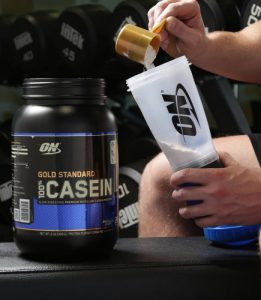
A characteristic feature of casein is its insolubility at a reduced pH (such conditions created by gastric acid). The mechanism of slow absorption of casein comes from its coagulability under the influence of gastric acid. The resulting coagulant precipitates and promotes a slow, steady growth of amino acids in the plasma. Given a number of reasons, casein protein is recommended to be taken to prolong the anti-catabolic properties (within 7-8 hours after administration), in contrast to whey protein, which is very rapidly absorbed.
Advantages of casein protein
The advantages of casein protein are off the scale, especially for adherents of the regime of active training. Great interest in casein protein and its effect on muscle hypertrophy is associated with his first studies, in which the intake of liquid milk with the intake of soy proteins was compared. His extensive study demonstrated the fact that milk proteins are superior to soy or other vegetable proteins in stimulating muscle hypertrophy after weight training. All major animal milk proteins (for example, casein, serum, albumin) are able to increase protein synthesis in muscles to some extent by activating the production of the target of rapamycin (mTT) in mammalian target of rapamycin (mTOR) and they are full-fledged proteins (possess all essential amino acids).
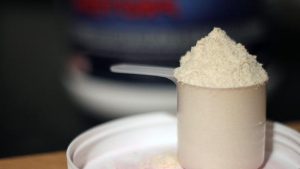
Although casein is undoubtedly effective for stimulating the synthesis of muscle protein, its main feature is the ability to create conditions in the body for moderate assimilation of amino acids as opposed to a rapid, transient increase in activity that can arise from the ingestion of whey protein. Taking this into account, casein is able to be incredibly beneficial for those who are looking for a protein supplement that promotes continuous muscle nutrition with proteins for several hours. This makes it possible to saturate the muscles with proteins for a longer period of time, compared to a rapidly digestible protein, such as whey. As mentioned earlier, casein is able to have such a long-lasting effect due to anti-catabolic properties, which is why people often call it optimal for taking “to sleep in the future”. Long-term digestion of casein helps maintain a positive nitrogen balance during extended hours of sleep. However, do not limit yourself to taking casein only at bedtime, because it can be beneficial and appropriate for most cases at any time of the day, before and after training (* more on this later in the section What is the best time for taking casein protein).
Another feature of casein is the rich content of calcium (more about this later in the section on micellar casein). As reported in a number of studies, calcium helps obese people burn fat, in addition, it is known, it is useful for the health of bones. For this reason, individuals who feel that they are constantly experiencing difficulties in meeting their daily dietary intake of calcium can benefit significantly from the administration of casein protein.
Overview of the benefits of casein
- Stimulates protein synthesis in muscles – activates the target of rapamycin in cells (mTOR).
- Casein protein is the source of the native protein (high-grade protein).
- Casein protein can be a useful appetite suppressant because it provides a longer feeling of satiety.
- Casein provides anti-catabolic properties for a longer time than rapidly digestible proteins.
- Calcium is very useful not only for bones but also for burning fat. Due to the fact that casein is saturated with calcium, it is useful for intensive training with weights, and its ability to restore bone tissues has a preventive effect on its destruction. To everything else, casein protein, thanks to an excess of calcium, is an assistant in burning fat.
- For people who need a quick and convenient way to increase protein intake with maximum effect, the reception of casein protein is suitable.
These people include:
- Bodybuilders and athletes who train to increase strength;
- Athletes;
- Vegetarians;
- Athletes-amateurs and beginners in training with weights and strength training;
- Anyone who is looking for an easy way to consume more protein in their diet (even despite allergies).
How Casein Protein Is Made
Casein protein is found in fresh milk produced by mammals. Additional types of casein are produced by various food technological methods, including acidification, ultrafiltration, enzymatic hydrolysis, salinization, and others. Powders of casein protein have a cream color and a mild taste/smell in the raw state. Casein protein supplements are maintained in the usability for about two years when stored in an original sealed container and stored at room temperature.
What is casein hydrolyzate and micellar casein?
Let’s examine the fundamental concepts of the structure of the protein and its digestion so that then prepared to proceed to consider the differences between the two forms of casein protein. Amino acids are combined through nitrogen-containing organic compounds, which in turn are formed by a variety of peptide bonds. These bonds inevitably “lyse” (i.e., burst) as a result of the hydrolysis process, which subsequently increases the concentration of free amino acids in the blood. Consequently, hydrolysis means the cleavage of the chemical bond in the H2O molecule.
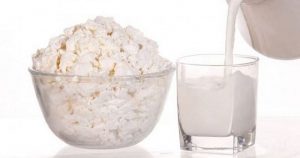
Casein hydrolyzate (or otherwise sometimes used as casein hydrolyzate) is enzymatically hydrolyzed by treatment to improve its absorption rate. Acceleration of digestion, absorption, and transportation of amino acids in skeletal muscle tissues is a consequence of the fact that the structure of the protein is substantially pre-digested (reorganized/reorganized) into smaller peptide fractions from their intact, original structure.
Micellar casein is a soluble, high-quality milk powder protein with a clean smell (with English – with a clean flavor). The micellar casein protein can be described, without going into details, as a non-denatured form of casein. In nature, most casein proteins exist in the form of those that are known as casein micelles. Casein micelles are colloidal particles that serve biologically to deliver insoluble calcium phosphate complexes into the stomach in liquid form to fall into suitable conditions for coagulation and digestion. In fact, more than 90% of the calcium content of skimmed milk is due to casein micelles. That is why, as already mentioned in the section on the benefits, the casein protein supplement can serve as a powerful source of calcium.
How to take casein protein?
Casein protein powder is used in many cases, as well as many other powdered proteins. Many people like the convenience potente.guru of having available on the go, so you can simply mix the casein protein in enough liquid (about 0.25 liters of liquid for every 25 grams of protein) with a spoon/blender/shaker adequate and that’s it. Based on its chemical properties, the mixture of casein powder will be slightly thicker than that of whey protein powders, and its texture can be described as a bit granular.
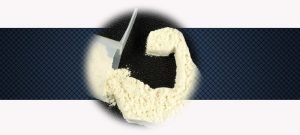
In addition, the characteristic coagulation property of casein is that when it is exposed to acidic environments and/or high temperatures, it complicates its use in baking or added to hot dishes, as it tends to be insoluble and crumble. But the remarkable use of casein protein powder (for those who would like to approach the issue creatively in the kitchen) – to make “protein pudding”, also in a colloquial speech called “thick neck”. As casein powder turns into a gel without any complications, it thickens when mixing in the smallest quantities of liquid, this can be a complete pleasure for those who are tired of always drinking their protein supplements.
What is the best time to take casein protein?
Casein protein is universal and can be used almost every time you want to strengthen the protein component in your diet. Casein is especially useful at a time when it is expected that you will be without food for a long period of time (for example, before going to bed). Casein protein can also be combined with serum protein to enhance anabolic response. If you are looking for the best solution for a period of time that goes right after training, try a combination of whey protein and casein supplement in a ratio of 2: 1, respectively. It’s a good time to use casein protein after bench press training.
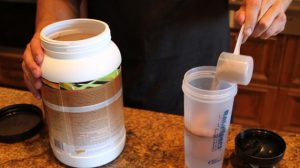
Casein before sleeping
Whey protein against casein protein
While whey protein is easily acid-soluble (which means it quickly increases the level of amino acids in the blood plasma), casein, in turn, coagulates when exposed to acidic solutions and slowly precipitates, this leads to a more stable rate of assimilation. High-quality proteins of whey and casein can improve protein synthesis in muscles after training, activating the production of rapamycin (mtor) target by signaling the cells.
As has been shown in a number of studies, whey protein, without outside help, effectively stimulates muscle protein synthesis after exercise, while casein protein, in fact, can act as a powerful complement to the serum by increasing the anabolic response for bodybuilding training. It will be useful to stop thinking about this issue as a dilemma. As well as whey protein, so do casein are your best assistants in the battle to build the physique of your dreams and they are perfectly combined in use, one complementing the other.
Casein Frequently Asked Questions (FAQ)
Will the reception of casein protein harm if I have an allergy to milk?
Sadly, the use of casein can not be safe, provided allergic reactions of the body to milk. Since milk proteins are recognized as allergens.
Is it safe to use casein protein if I have lactose intolerance?
Yes, it is harmless, since casein is a protein in milk and it has nothing in common with lactose (which is regarded as a sugar component of milk).
Do the casein proteins contain almond milk or rice?
No, it’s vegetables / cereal-based foods. Dairy products and casein protein cover dairy products of animal origin.
How much protein should I try to take every day?
Depending on your goals, lifestyle, and metabolic factors, the value of the amount of casein that you should strive to vary will also vary. For training athletes, a good ratio, which can be taken as a basis of the order of 1 gram of protein per 1 kg of muscle mass.
Can I take casein supplements while I’m a vegetarian?
Yes, because for athletes who abstain from animal protein sources, casein supplements are a healthy alternative as a source of protein.
And can I, for example, drink milk instead of buying supplements of casein protein?
Yes, at the same time, if you always strive for winning and profitable decisions, then in terms of the ratio of the price per gram of protein, it will be more appropriate to use a dietary supplement of pure casein protein, since milk contains other nutrients, such as carbohydrates and fats.